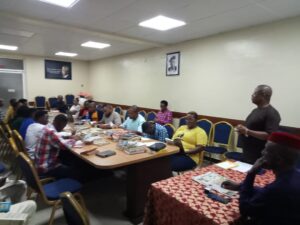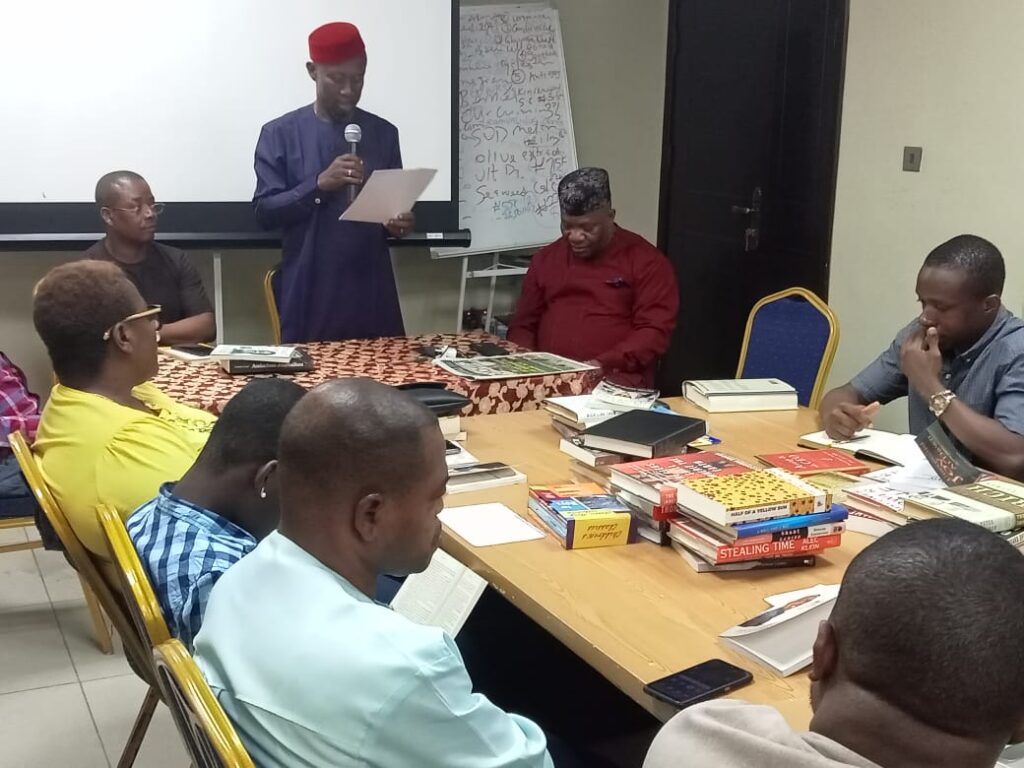Arnold Udoka, Ph.D
Chapter 9, The Reluctant Schoolboy, is about Akan rejecting to no avail, his oversized school uniform sewn by his mother. He is forcefully dressed in his oversized uniform and literally dragged to school.
At registration in the school, Akan is so miffed by uncle Ekong’s character and betrays to his mother, a radical trait earlier unknown to the mother. He chooses not to share the same surname with his terror of an uncle, Ekong. Instead, he chooses Godsday as his surname. His young mind attempts to differentiate between good from evil and to stand by that which is and represents good. For his age, that is as radical as it can be. Now in school, the luxury of long sleep is lost; cream for the body is squeezed from chewed palm kernel oil mixed with a good dose of saliva. Three square meals a day is not on the cards and a meal a day is luxury of sorts.
Read also: Review of Village Boy (1)
In Chapter 10, A Native Doctor and the Bonesetter, Akan’s knowledge of Arithmetics is befuddled by the teacher’s innocent question on addition which demands the character of the young man’s late father as the one to provide another N10 to Akan’s N10 and how the two would sum up. In the dramatic exchange between teacher and pupil, the boy’s answer to the effect that his father is dead draws on the teacher’s commiseration. His sense of humour elicits laughter in the class when he informs them that his uncle cannot give him one kobo not to talk of N10. The idea of very high standards of hygiene both at school and in the village are on display here and sanitary inspectors still ensure that there is no let up in that regard. It is the ripe guava that causes the danger that leads to Zacchaeus’s fractured left femur.
Local specialties in medical therapies are on display in this chapter, but the chief is that of bone setting. Akan’s friend Zacchaeus has the bonesetter to attend to his orthopaedic debility. Zacchaeus plays pranks as he directs the bonesetter to his knee instead of the left femur for months and suffers the pain. Too late though because Zacchaeus has a limp to trademark his walk as the price for hiding the fractured left femur. He is nicknamed Limping Zacchaeus. A subtle lesson in honesty. Grandma too who provides medical therapies of different types, is a farmer and the leader and mother of all the women of Afaha Akpan Iman Ibom.
Chapter 11, A Teacher and the Hunter’s Son, first shows Akan, Grandma’s Uko Mmi as a hardworking boy who assists Grandma in the farms in spite of pepper, water and salt soup with cassava dough for after-school-lunch. One morning at school, the flogging of Ita, a hunter’s son by the Compound Master, Mr. Ekpo for late coming, causes hell to let loose. Ita’s father, a hunter, arrives the school and releases two shots from his Dane gun into the air. That automatically is the ‘bell’ that ended school activities for the day. Both teachers and pupils scampered to safety in the nearby bushes where to most pupils, like locusts, snack away on raw cassava tubers in the nearby farms around the school without any care about who owns the farms.
Chapter 12, Cheat Udo No More, is a confirmation of the notion that the church as introduced to the village and elsewhere is a veritable source of material wealth and this has led to the proliferation of places of worship by disgruntled elements with names that brand them as sole proprietorship setups. The drunken preacher Atimoti (Timothy) misses the time to preach due to drink-induced sleep in the vestry. The encounter between the crafty prophet and local politician by the name Money Hard is pure rib-cracking comedy fit for theatre. Here, the trickster meets a masterful trickster and there is no ‘harvest’ of any kind. This chapter draws attention to a burgeoning community of fraudsters in the name of religion cashing in on hordes of gullible individuals who are seeking a closer relationship with God.
Chapter 13, Motorcade In A Trance, is a 1960s memory. The school drives home the import of obedience to constituted authority and exposes young and impressionable Akan to a glimmering motorcade during the visit of Dr. Michael Okpara, the Premier of the Eastern Region. This image captures Akan’s imagination and he ruminates on it to the point that it played out in full colour on the canvas of his mind. Can Akan can the can for the future?
Chapter 14, A Journey Too Far, is a trip from quietude to bustle. The road in the village leads Akan and Grandma out and for the first time to break free of the village to faraway Aba. The truck christened The Lord is My Shepherd is the regular and dedicated vehicle for such trips. On Aunty Meme’s invitation, Akan enjoys his first ride in a lorry from the village to Aba although he sleeps halfway through after a talkative session with Grandma and containing the abusive truck conductor. The illusion of trees always running when people are going to Aba or any where is the first impression every child receives on his or her first ride in a car. Akan is no exception and, perhaps, Grandma only conceals hers. Akan mistakes a train for a very long bus until he is corrected by the conductor. In a typical Afaha dialect, the young man yells, “Yiiisors!” – the adulterated pronunciation of the name, “Jesus.”
It is in Chapter 15, A Different Calabash of Fish, that the culture shock that Grandma has for having to climb a staircase to a house above the ground; the sight of an inbuilt toilet throws Grandma into confusion and tells the reader of her first trip outside of Afaha Akpan Iman Ibom. Befuddled, the two-week holidays in Aba is cut short by Grandma after five days with the excuses of missing home, her goats, farms and midwifery business. Akan, though not happy with such development, has no option than to leave with Grandma back to Afaha Akpan Iman Ibom. Returning on another truck from Aba, this time christened After God Fear Women, one cannot tell what is running through Akan’s mind. However, the story of the accident that befell The Lord Is My Shepherd makes Akan melancholic, but he is able to affirm his faith in the words that trademark Psalms 23.

Members of Uyo Book Club listening to the review of Village Boy
In Chapter 16, A Labourer in the Farmyard, Grandma returns and buys a new farmland and the reader comes to know Akan as the village letter writer while getting ready for the final examination in primary school. To raise money for her grandson, Grandma is able to secure, not a loan, but labour for Akan who is known for being good at weeding. Akan becomes a labourer in the farm of Ete Obot, the palm produce buyer, to raise N2.50 for his First School Certificate Examination. The trickish palm produce buyer doubles the task and yet poor Akan and his friend Udoma with a partial help of Grandma is able to complete the tedium of weeding a farm about the size of a football field in a day. This feat does not go down well with Ete Obot considering that it is N2.50 he has spend. The young Akan is also asked by Ete Obot to fence his barn for yams, cocoyams and water yams for the cost of one job. He completes the job and raises the money for his final examination in primary school.
Chapter 17, The Best Bicycle Repairer that Never Was is where Akan rebels, in spite of the insistence of his good Uncle Etim, from serving apprenticeship as a bicycle repairer, photographer and instead engages in menial jobs which sometimes the wage is the wish of “God bless you”. The fascination with the Dr. Michael Okpara’s motorcade is his companion and so, to serve apprenticeship in photography under Holy Moses is not on the cards. His mind focuses on going to secondary school and indeed, he had made up his mind and his mind is made up. What an affirmation? The fascination with the motorcade refuses to go.
Udoka is a Scholar-Artiste, Choreographer, Writer and Winner 2010 Association of Nigerian Authors NDDC J. P. Clark Drama Prize and Nominee 2014 NLNG Literature Prize.
To be continued


1 Comment
Pingback: Review of Village Boy (3) - StraightNews